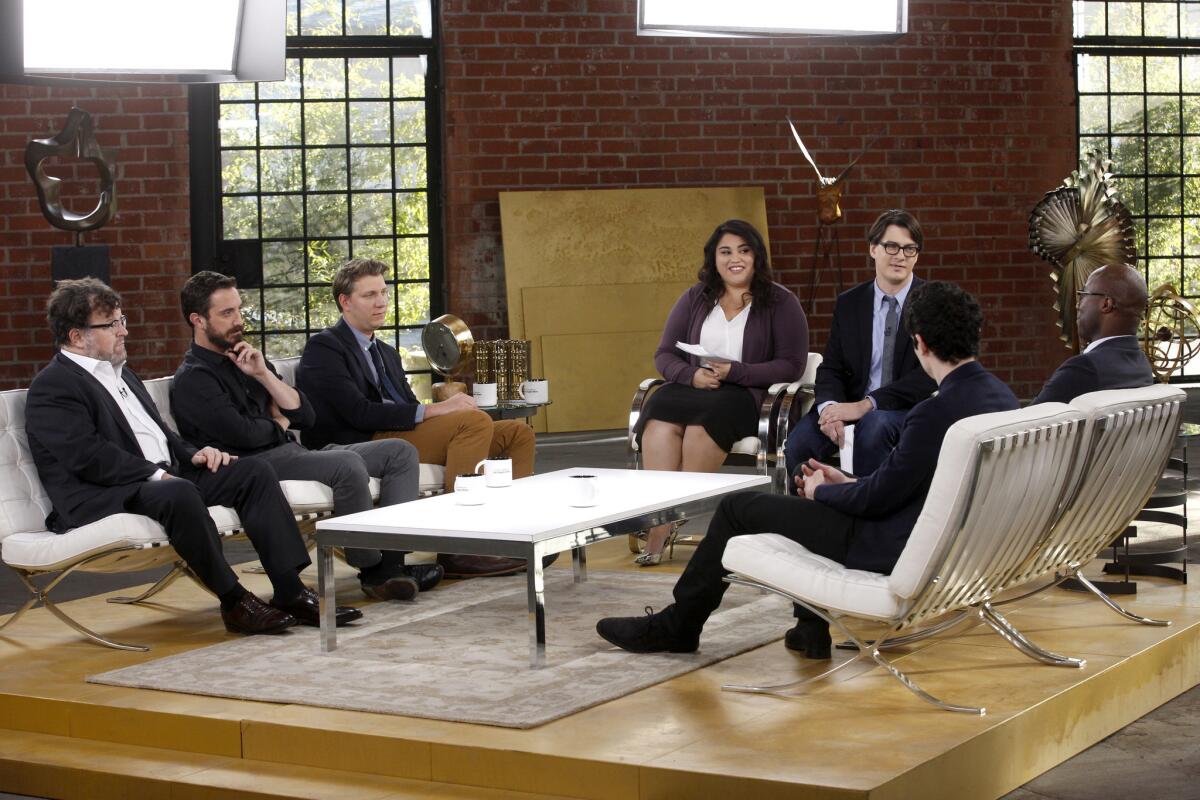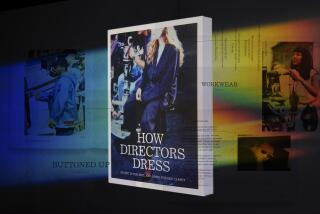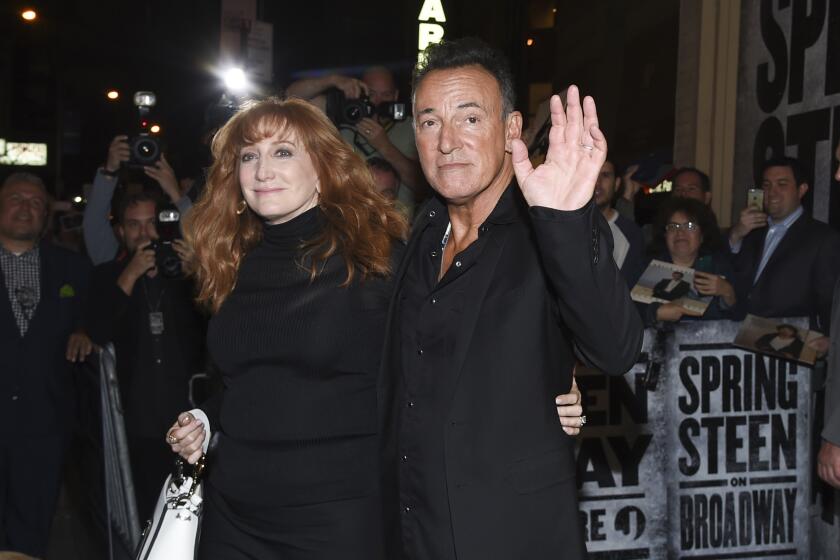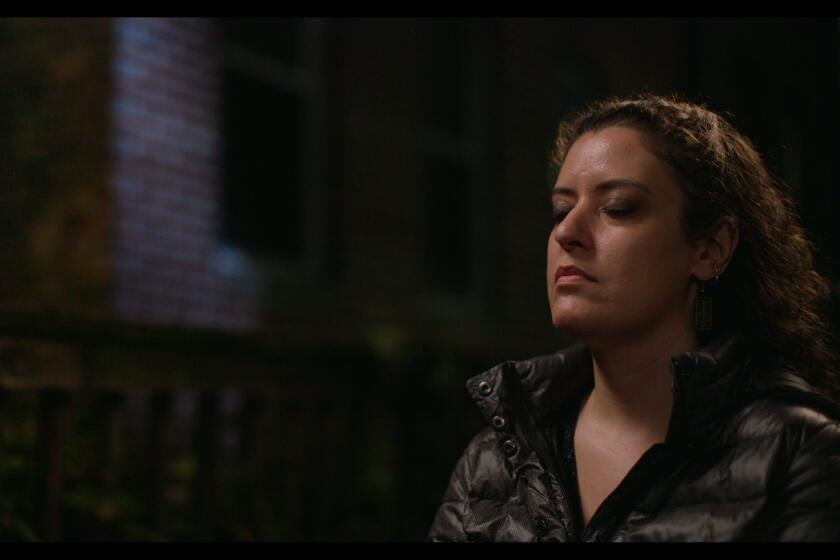When the world feels dangerous, films showing the human experience are key, directors say

2016 film directors Damien Chazelle, Barry Jenkins, Pablo Larraín, Kenneth Lonergan and Jeff Nichols swap stories about the magic that happens on set.
Give one script to five different film directors and the resulting movies will undoubtedly be quite different. So maybe it’s of no surprise that the participants in this year’s Envelope Directors Roundtable were curious and eager to get one another’s perspectives on filmmaking.
The Envelope gathered filmmakers whose work this season made viewers think, feel — and even bop along in their seats. Participating were Barry Jenkins, director of “Moonlight,” a film that chronicles the coming-of-age of a gay black boy in Florida; Jeff Nichols, for the intimate portrait of a marriage that changed history in “Loving”; Kenneth Lonergan, for the harrowing New England-set family drama “Manchester by the Sea”; Damien Chazelle, for the contemporary L.A.-set musical “La La Land”; and Pablo Larraín, for the historical drama “Jackie.”
The five directors came together in downtown Los Angeles recently for a thoughtful conversation that touched on the new era of filmmaking and a film’s role in contentious political climates. Here are excerpts from the conversation.
Why did you want to become a director, and who were the filmmakers that were influential for you?
Lonergan: I wanted to be a director first to protect my writing. I’m a playwright and you don’t need to protect your writing when you’re in the theater because everyone’s there to protect the writing. When I had an idea for a film that I really cared about as my own, I wanted to direct it, and then I immediately became interested in directing in and of itself because it’s such a deep art. You suddenly have all these tools at your disposal to tell the story. [With theater] you draw the audience into the room as best you can, and in film, you can draw them into the room, you can draw them outside into the desert, you can take them out into the ocean, you can do all these amazing things.
Nichols: I grew up in Arkansas where there was no film industry. I decided to go to film school but it was really because I didn’t have anything else to do and it wasn’t until I went that I realized, “Oh, this is what it is, this is what the process is.” And fortunately, I liked it. I liked those things that Ken is talking about. I liked choosing lenses and I liked working with these people and writing a movement and seeing it carried through to a visual fruition right in front of you.

Director Jeff Nichols filmed “Loving” in locations where the Lovings’ true-life story took place. He feels such authenticity is essential to accurately convey their lives.
Jenkins: I was at Florida State and saw the sign that said Film School so I thought I’d apply and try to get into screenwriting. At that school, you do everything. You have to write and shoot and direct and gaffe and grip and all this stuff. It was one of the best experiences of my life because I had to ask myself: Am I not good at this because I’m poor and I’m black and my mom was a crackhead? Or am I bad at this because I don’t know you need light to expose film? I just took a year off from the program, I took a still photography class, started watching a lot of foreign films — probably too many based on what I do in my movies now. And I came back and I made my first short and it worked. I had proved to myself that it’s not because you’re black and you’re poor and this and that, you just don’t have the knowledge. And if you seek it, you can apply it.

Pablo, is your work informed by other filmmaking?
Larraín: It’s hard to avoid it. I grew up watching movies that just transformed my vision, not just in cinema, in life, and you discover that this — it’s an endless tool and to think about the movies that are here [in this group], they’re very, very different and they’re made with pretty much the same elements, and that’s why it’s so fascinating. Everything is possible and when you have that toy, you just cannot get away from it.
Jenkins: I love that you call it a toy. It should be.
Larraín: It is somehow. We are kids. The only difference is the toy we have.

“Jackie” director Pablo Larraín talks about Jacqueline Kennedy’s eyes as portals to understanding her and trying to capture that on film with Natalie Portman.
How much would you say the scripts evolved as you began shooting?
Jenkins: One of my producers freaked out, she was like, “Oh, what are you doing? That’s not in the script.” I was like, “Oh, well, I’m not making the script right now, I’m making what’s in front of me.” Because the script is this thing in my head and it’s on the page, but if I try to conform what’s in front of me to the script, we’re not gonna get something that’s fully lived; that’s just this flesh and blood and passion in it.
Lonergan: I don’t think fast enough on my feet in terms of the writing to change the script too much when I’m shooting it. I like to have it set and done and know that I feel good about it and I might add a few lines here and there while we’re shooting, if I think of a new joke, I might toss it in, but for the most part, I try to stick to the written script and have all the latitude exist within that.
Nichols: I’m more on that side of the couch. I get nervous. I always approached it as, look, I just have to make sure I get what’s here on the page. The guy that wrote this was in a room for years thinking about it, so before I change it — I’m fine changing it, but I want to make sure I know why, because everything kind of has a reason. It can be limiting because sometimes stuff feels too stiff, but other times it gets you through those times where you’re tired and confused and you can just go back to it and say, well, I know I wrote this for a reason. Why? Let’s make sure we understand it.
Ken, you find yourself part of this new era in the film industry — Amazon secured the domestic rights to “Manchester by the Sea” and partnered with a distributor for its release in theaters. What do you all think of these new players? Does it create more opportunities? Is there a downside?
Lonergan: Amazon is doing a very traditional release with my film and with a lot of the movies that they’ve bought. They really want to be distributors, so it’s not going right to the computer, it’s going into movie theaters and they’re doing a platform release. They’re really supporting the film in a really traditional way. I’m glad they’re supporting my film for personal reasons, but also even if it weren’t my film, it’s a film made by people who wanted to make the movie and who cared about the movie. I love and respect bigger movies that have explosions and spaceships in them and I like to go see them, but that’s not the kind of movie [Amazon] is using as their intro to the film distribution business, so, I don’t see where the downside is to have another distributor who’s interested in doing personal movies that we’re all interested in making, and that I think people are really interested in seeing.
There’s been what I suspect is a lie that audiences are not interested in these kinds of movies, except art-house audiences or cinephiles, and I think it’s a self-fulfilling prophecy. I would love to take control of the entire universe and for five years you give every movie the same widespread distribution no matter what movie and see if there’s a real discrepancy between people coming to see films like these and science-fiction films or superhero films. I seriously bet there would be no discernible difference.

“Manchester by the Sea” director Kenneth Lonergan describes jumping into the “river” of creativity with the actors who bring to life his characters.
Chazelle: The more players, the better, to a certain extent. Because I think there was such a kind of historical drop off of the kinds of places that support these kinds of films. Now it feels like finally in the past few years, new players are emerging, that are kind of taking some of that spot and I sometimes think of myself as like a naïve optimist in this regard that we are on the cusp of things really sort of blossoming in the way that they did during eras like the ’70s where there was an infrastructure for very personal filmmaking, but that was distributed to a wide audience, eras like the ’90s where studios had all their subdivisions suddenly popping up in the wake of “Pulp Fiction” and you kind of had a rain of personal filmmaking on a big scale.
I just want to make sure that in 10, 15 years when my son grows up, he can go to a movie theater and have a shared experience that isn’t just a blockbuster.
— Jeff Nichols, “Loving”
Nichols: My big fear is that right now, Amazon and Netflix are putting our films in the theaters, but there’s going to be a sea change at some point where they don’t have to. That’s what I’m afraid of. At some point, the dream that you’re talking about is gonna be everything is available — just not in theaters. I just want to make sure that in 10, 15 years when my son grows up, he can go to a movie theater and have a shared experience that isn’t just a blockbuster. I love that Amazon is doing that right now, and I hope Netflix does it as well. I think Amazon has shown the value in taking a film like [Ken’s] out into the platform release, although a platform release [which opens a film on limited screens in major urban centers before expanding — or not] is the bane of my existence as a filmmaker and as an Arkansan growing up, it just seems so judgmental of the middle of the country, but I just hope it stays that way.
We’re having this conversation about a month after the recent presidential election. Do you have any sense whether you feel differently about your movies now, or maybe that audiences are responding differently?
Nichols: I’ve just felt the volume turned up on the reactions. They were having the reactions before, positive and negative, but after the election, it almost seems like now they’re even more positive. We need it more, or they’re more angry that it didn’t do x, y and z for them. And it just seems everybody’s kind of cranked up a little bit.

Once director Damien Chazelle got the go-ahead to make “La La Land,” he had to face the “panic attacks” of making his dream happen. He decided to go for broke and put everything he had into it.
Chazelle: In terms of reactions I’ve been seeing — [“La La Land”] does seem to kind of paint a world that is a hopeful world, maybe a little more hopeful than what our world feels like right now. I guess I have a little bit of a problem with the idea of movies as purely escapism. I say this as obviously a giant fan of what were often considered escapist movies, you know, Fred & Ginger musicals or John Ford westerns or science-fiction movies of the ’50s — movies that were kind of Hollywood confections that I think at their best actually were completely about what was going on in the country then. I think the Fred & Ginger series of pictures are completely tied to the Depression even as a total counterpoint to it, maybe. The Jacques Demy musicals in the ’60s were completely about what was happening in France and the Algerian war and the wake of that, in the ’50s and ’60s. But they do it in a completely indirect way, that is to say, there doesn’t have to be a literal commentary, they do it in a metaphoric or poetic way, through color, through movement, through music. But it all has to reflect back on the humans. It all has to reflect back to how you’re feeling, how you’re feeling about the people around you, how you’re feeling about where you’re living so that hopefully when you come out of the theater it’s not that you were off in a completely different world, it’s just that you were looking at the world you’re living in but with a certain set of glasses, a certain perspective that maybe gives you a new take on it.
Larraín: Cinema is always a political art, at the end. I’m not an American as you know, and to deliver “Jackie” today in the United States and understanding the role of women in society is changing and I hope it just gets better and better — and also in cinema. There’s very few interesting roles today for women in cinema. It’s getting better and stronger and, and I’m proud to be part of that.
Jenkins: Yeah, I saw “Jackie” before the election, long before the election, and I’ve been thinking about it, because I have a whole different perspective on it now. Just watching Natalie [Portman] go through that, and, and watching Hillary [Clinton] give her concession speech, it totally changed my perception.

WATCH: When Barry Jenkins directed Naomie Harris in “Moonlight,” he realized that following his emotional response to serendipitous moments in front of the camera was sometimes more important than strictly following the script.
Lonergan: I think the more dangerous and dire the political circumstances seem, the more you attach value to anything that shows you why a human being is a human being or human experience or view of the world in that way. Just like “Moonlight,” or all these pictures, they’re about when you’re worried that people are turning into monsters and the world is really heading in a very dangerous direction, it becomes that much more valuable and important to go to the movies and see human beings that are human beings.
The most-read Entertainment stories this hour »
Twitter: @villarrealy
ALSO
Why does director Mel Gibson see ‘Hacksaw Ridge’ as a love story?
Palm Springs International Film Festival is an oasis of global discoveries
Welcome to the ‘Jungle Book’ — filmmakers detail the making of the live-action marvel
‘Arrival’ cinematographer Bradford Young dives deep into the shadows
More to Read
Only good movies
Get the Indie Focus newsletter, Mark Olsen's weekly guide to the world of cinema.
You may occasionally receive promotional content from the Los Angeles Times.












